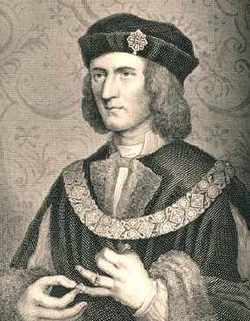According to
MSNBC.com:
King Richard III of England had the honor of being memorialized in a William Shakespeare play after his death in battle in 1485. Now, modern-day archaeologists are on the hunt for the medieval king's physical resting place.
The University of Leicester, Leicester City Council and the Richard III Society have joined forces to search for the grave of Richard III, thought to be under a parking lot for city council offices. The team will use ground-penetrating radar to search for the ideal spots to dig.
"This archaeological work offers a golden opportunity to learn more about medieval Leicester as well as about Richard III's last resting place — and, if he is found, to re-inter his remains with proper solemnity in Leicester Cathedral," Philippa Langley, a Richard III Society member, said in a statement.
Richard III was King of England from 1483 to 1485. He died during the Battle of Bosworth Field during the War of the Roses, an English civil war between the House of Lancaster and the House of York. Richard III was the last English king to die in battle. Shakespeare penned "Richard III," a play about the tragic king, approximately 100 years later.
Regardless of his Shakespearean claim to fame, the king was talked about in his own right. "Richard III is a charismatic figure who attracts tremendous interest, partly because he has been so much maligned in past centuries, and partly because he occupies a pivotal place in English history," Langley said.
"The continuing interest in Richard means that many fables have grown up around his grave." Langley said, adding that some far-fetched tales include that the bones were thrown into the river Soar. [ The Science of Death: 10 Tales from the Crypt ]
"Other fables, equally discredited, claimed that his coffin was used as a horse-trough," Langley said.
After his death, the king was stripped and brought to Leicester, where he was buried in the church of the Franciscan Friary, known as the Greyfriars. The location of Greyfriars was eventually lost to history.
"The big question for us is determining the whereabouts of the church on the site and also where in the church the body was buried," University of Leicester archaeologist Richard Buckley said in a statement. "Although in many ways finding the remains of the king is a long-shot, it is a challenge we shall undertake enthusiastically. There is certainly potential for the discovery of burials within the area, based on previous discoveries and the postulated position of the church."
The search begins on Aug. 25. If remains that could be Richard III are found, they will be subject to DNA analysis at the University of Leicester.
Check out this great podcast on the Common Core Standards for public education from WHYY.org:
When No Child Left Behind (NCLB) became law in 2001 it promised to improve public education by raising standards and establishing measurable goals for student progress. While the law was praised for making schools more accountable, it was highly criticized for an over-focus on high-stakes testing which led to several serious cheating scandals. The Obama administration has gradually dismantled NCLB by freeing states from meeting many of the law's requirements and has replaced it with its own education initiative, Race to the Top, that rewards states for adopting national standards for what students should know and learn. Delaware, New Jersey and Pennsylvania are among the 45 states (and the District of Columbia) to adopt the new Common Core Standards that set benchmarks for English and Math education aimed at making American students competitive in the global workplace.
What are the Common Core Standards and how will they change the classroom and the way students, teacher and principals are evaluated? We've invited ANDREW PORTER, dean of the Dean of the University of Pennsylvania’s Graduate School of Education, to join us to explain this next wave of education reform. Then we'll hear from JOHN MICEK from the Allentown Morning Call about the ruling on the legality of Pennsylvania's voter ID law.



